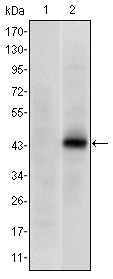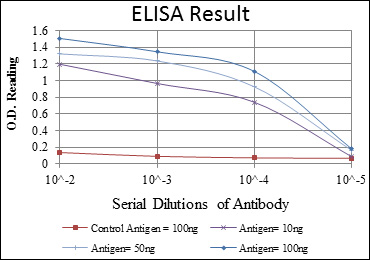Pax-4 Monoclonal Antibody
- 货号:YM0507
- 应用:WB;ELISA
- 种属:Human
- 简介:
- >>Maturity onset diabetes of the young
- 蛋白名称:
- Paired box protein Pax-4
- 免疫原:
- Purified recombinant fragment of human Pax-4 expressed in E. Coli.
- 特异性:
- Pax-4 Monoclonal Antibody detects endogenous levels of Pax-4 protein.
- 组成:
- Liquid in PBS containing 50% glycerol, 0.5% BSA and 0.02% sodium azide.
- 稀释:
- WB 1:500 - 1:2000. ELISA: 1:10000. Not yet tested in other applications.
- 纯化工艺:
- Affinity purification
- 储存:
- -15°C to -25°C/1 year(Do not lower than -25°C)
- 其他名称:
- PAX4;Paired box protein Pax-4
- 背景:
- This gene is a member of the paired box (PAX) family of transcription factors. Members of this gene family typically contain a paired box domain, an octapeptide, and a paired-type homeodomain. These genes play critical roles during fetal development and cancer growth. The paired box 4 gene is involved in pancreatic islet development and mouse studies have demonstrated a role for this gene in differentiation of insulin-producing beta cells. [provided by RefSeq, Jul 2008],
- 功能:
- disease:Defects in PAX4 are a cause of noninsulin-dependent diabetes mellitus (NIDDM) [MIM:125853]; also known as diabetes mellitus type 2 or maturity-onset diabetes. NIDDM is characterized by an autosomal dominant mode of inheritance, onset during adulthood and insulin resistance.,disease:Defects in PAX4 are the cause of maturity-onset diabetes of the young type 9 (MODY9) [MIM:612225]. MODY [MIM:606391] is a form of diabetes mellitus characterized by an autosomal dominant mode of inheritance, age of onset of 25 years or younger and a primary defect in insulin secretion.,disease:Genetic variations in PAX4 are associated with susceptibility to insulin-dependent diabetes mellitus (IDDM) [MIM:222100]. IDDM normally starts in childhood or adolescence and is caused by the body's own immune system which destroys the insulin-producing beta cells in the pancreas. Classical features are polydipsi
- 组织表达:
- Colon,Insulinoma,PCR rescued clones,Placenta,

- Western Blot analysis using Pax-4 Monoclonal Antibody against HEK293 (1) and PAX4-hIgGFc transfected HEK293 (2) cell lysate.





